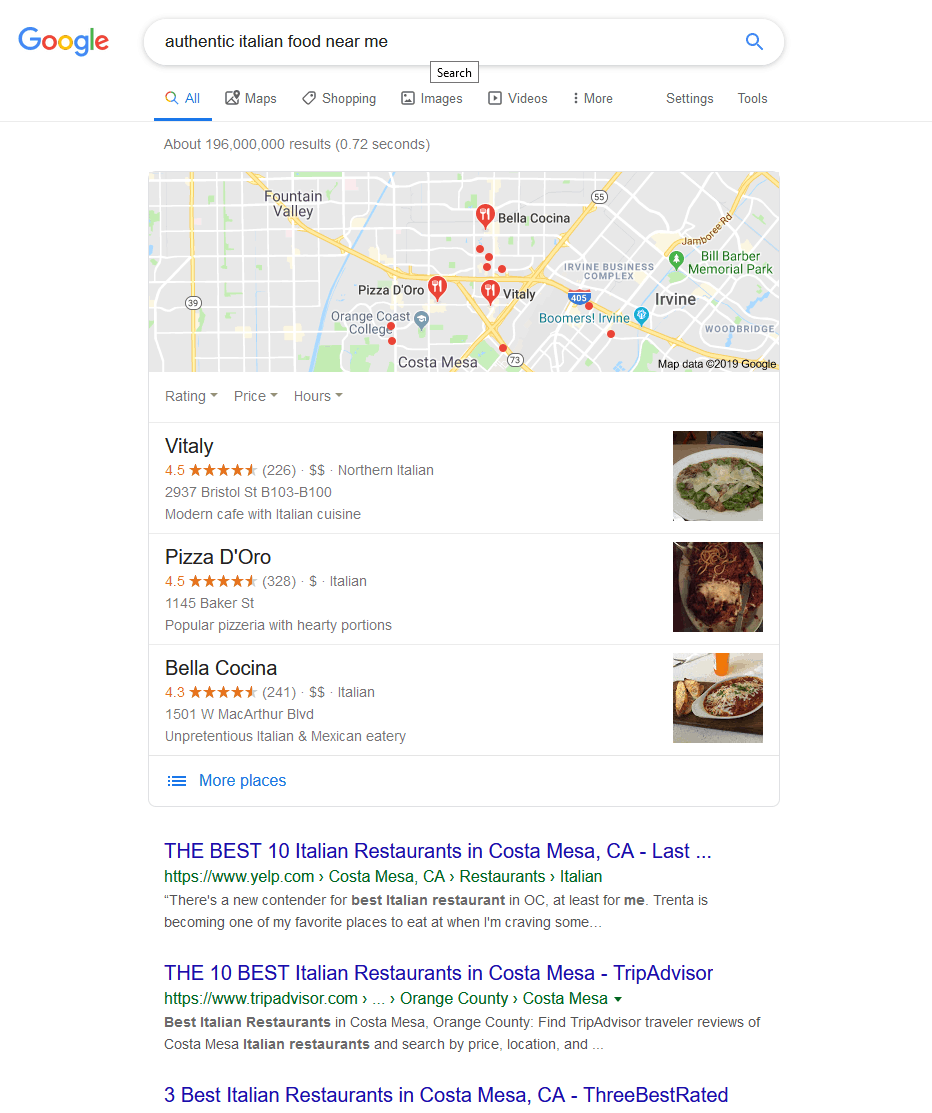What is SEO?
SEO means Search Engine Optimization. It’s a marketing process where setting up a website and creating new content with knowledgeable techniques that can help rank better on search engine results. SEO often uses words, keywords, and phrases to help accomplish this type of goal. Whether you want to create an e-commerce site or begin a killer blog for your brand, there are some benefits of SEO content strategy you should know about!
Why Does SEO Matter?
SEO matters because it’s basically how search engines, like Google, connect the dots between questions and answers people search for. It’s a long-term, foundational way for your website to grow in organic traffic. That is traffic to your site that isn’t bought through ads.
For example, when you want to discover a new restaurant in town, where do you go? You type what you’re looking for on the internet. Let’s say, “authentic Italian food near me”. The results that show up are all using local SEO practices– hence, the websites and locations will contain something relevant to your search. Things like “Italian food”, “Italian cuisine”, etc.

SEO optimizes the keywords on your site to show up on search results pages for a relevant (and helpful) user experience. It helps create an opportunity for the links and content on your site to be seen as credible not only from readers but from the robots on Google and search engines.
SEO Goals:
- Get more traffic to your company website
- Grow to one of the top results on the SERP (Search Engine Results Page) for your niche
- Have a good online reputation
- Increase client leads and sales calls from having a visible site
- Overall increase annual revenue
How Can SEO Improve Digital Marketing?
If you’re not using SEO, are you even digital marketing correctly? Probably not!
A solid marketing strategy will absolutely include SEO as one of the top priorities, at least on a basic website level. You might have a beautiful website or maybe even a passionately informative blog. But at the end of the day, if the main benefits of SEO content strategy aren’t in place, nobody will be able to find or read your content.
The ultimate goals of establishing Search Engine Optimization on your website are:
- Valuable Relevancy
- Search Rank
If you know anything about Marketing, you know these two things are the first step to the sales funnel. And that’s why effective SEO is so crucial to anyone trying to operate a business using the internet.
What is SEO Content Strategy?
A content strategy is a plan and schedule of the content you or your team will be releasing through the internet so you can provide value and interest to target audiences. Any promising content strategy is based on SEO and keywords research.
There are a few reliable ways to research what topics to write about on your website! They include:
- SEO Keywords research (through analytics tools etc.)
- Observing competitors and how their posts do well
- Direct feedback from your audience in what they want to learn or see from you
- Topics that rank well on Google search

Long-Term Benefits of SEO Content Strategy
First, you need to know your target audience. There are people and communities who are looking for your product or service. In one way or another, they want guidance. They want their lives to be improved and they are expecting someone (like you!) to help them.
Finding out who your audience is, and what questions or keywords they rely on to find the help they need in your niche, are the first steps you need to form a kill content plan.
Along with the beginning stages of content creation, you’ll want to ask some helpful questions to get the ball rolling.
Ask yourself:
- What are my audiences’ pain points and desires?
- Where does my audience hang out on the internet?
- How can my company come in as an expert for these audience groups?
- What can we give to the audience to solve their pain points?
- How can we create value that gives these solutions in a way they will want to learn more from us?
Aren’t SEO and Content Marketing the Same Thing?
Some people think SEO and content marketing are two totally separate things. But in reality, they often go hand-in-hand. Years ago, it was doable to create a piece of content that didn’t worry too much about the SEO aspect. But not anymore.
A worthwhile content marketer should and will know about SEO. The two absolutely overlap. In order to properly run, SEO needs content to exist! And content marketing is the thing that markets SEO into the internet realm. The most sustainable tactic with website content is maintaining an underlying routine of SEO.
What is Content Marketing?
Content marketing is intentionally creating valuable content on a website or internet platform with the goal of a potential conversion rate.
Smart content marketing campaigns include:
- Interesting and informational content for readers to consume, FREE of charge
- Shareability and engagement (has the potential to go viral, like a video, article, meme, etc.)
- A genius Call to Action (CTA) motivating consumers to like, subscribe or check out more of your site
- Increase company awareness
- Strategy to provide content covering relevant topics with a higher search volume
The end goal? Improve conversion rates and grow overall business sales.
Effective SEO helps bring internet users to your website. Reliable content marketing help keeps them interested in the ways you’re offering to help them.
SEO + Content Marketing = Conversion Strategy.
How Can You Start to See the Benefits of SEO Content Strategy?
These days, most professionals want to see SEO content strategy to know how they will eventually improve in link building and Google search. It can seem confusing at first, but there are several main things that create a general overview of the things a great SEO content strategy must have to improve said rank.

Topics
The topics of your SEO content need to be researched, optimized, and include the most relevant keywords to your niche. That way, users (and search engines) can credit you, share your service website, and remember your relevancy on such topics.
Internal Links
You not only need to be putting out great content– you also need to internally link other parts of your site to pages that show up on Google. For example, if your top-visited blog post is about natural makeup remover and you run a brand that sells minimal-ingredient cosmetics, you’ll definitely want to include some anchor text links about some of your products within that article. Internal links simply mean you source other pages or posts from your website throughout one post (they must be relevant, of course).
Link Shareability
On the other end, your URLs (AKA slugs) should be readable, not too long, and contain keywords. This way, your links are shareable and linkable throughout the internet and social media.
Updates and Maintenance
If there is a popular article on your website that is a few years old but still showing up in results pages, you might want to update it to align with the times! Not only that, people tend to want the most recent (and relevant) information when searching for an answer. What’s the first thing a lot of us do when we find an article or advice column? We read the date. So, if you want to keep things fresh, once a month go back and update old content with new information, updates, and internal links to remain helpful year-round.
Want more benefits of SEO content strategy?
Reach out to us and learn more. Our content strategist, content creator, and SEO expert is– hint– the same person! We love sharing a thing or two about all things to improve your website, your internet rank, and generating better content for all.
We are one phone call away: Click Here to schedule a free strategy session.





